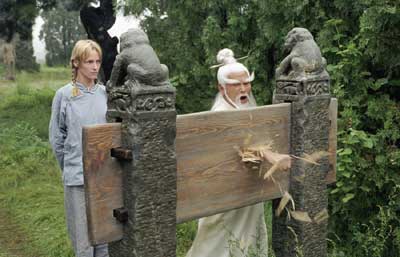 Surprisingly
flaccid stuff from flashy filmmaker, Quentin Tarantino (Reservoir
Dogs,
Jackie Brown), who once again falls so in love with his own
characters and his prolific imagination, that the second part of his
split three-hour movie almost creeps toward the three-hour mark
itself. Padded to excess, Kill Bill Vol. 2 is
about three solid scenes stuffed in between about 20 that could easily
have been trimmed down, or excised altogether. The pacing and
direction is quite different than
Vol. 1,
which managed to elevate itself from its derivative inclinations
through the exhilarating back-and-forth styles and set pieces.
Vol. 2 is a dull film from one of the sharpest minds in the
industry, a man who really would have done himself a world of good by
keeping the entire production, Vol. 1 and 2, to the
length of this one alone. Thanks for letting us see all the
deleted scenes before the DVD comes out, Quentin.
Surprisingly
flaccid stuff from flashy filmmaker, Quentin Tarantino (Reservoir
Dogs,
Jackie Brown), who once again falls so in love with his own
characters and his prolific imagination, that the second part of his
split three-hour movie almost creeps toward the three-hour mark
itself. Padded to excess, Kill Bill Vol. 2 is
about three solid scenes stuffed in between about 20 that could easily
have been trimmed down, or excised altogether. The pacing and
direction is quite different than
Vol. 1,
which managed to elevate itself from its derivative inclinations
through the exhilarating back-and-forth styles and set pieces.
Vol. 2 is a dull film from one of the sharpest minds in the
industry, a man who really would have done himself a world of good by
keeping the entire production, Vol. 1 and 2, to the
length of this one alone. Thanks for letting us see all the
deleted scenes before the DVD comes out, Quentin.
The plot is
still as simple as can be. In this half, we find The Bride
(Thurman,
Gattaca)
still seeking revenge on the people that ruined her life and left her
for dead, including the titular Bill (Carradine,
Death Race
2000).
As a writer of
dialogue, Tarantino is terrific. As a director, he has his
moments, but clearly, most of his best moments are blatant plagiarism
of other more visionary directors. As a conceptual editor,
Tarantino is his own worst enemy, never knowing when enough is enough.
If you were to trim down Vol. 1, then inject about a
half hour of Vol. 2's expository elements, you could
make a great movie. Alas, like Tarantino did for his overly
saggy, Jackie Brown, Kill Bill Vol. 2
is full of lengthy moments of inaction, neither pushing the story
forward, nor entertaining. Watching this film, it is unclear why
Tarantino insisted on keeping all of it, but the answer probably lies
in the label for which he will probably be stuck with his entire
career: egotism.
This film is
talky -- much more so than Vol. 1. This
shouldn't be such a bad thing, as Tarantino's films are usually more
fun through the interactions between the characters alone, but not so
in Vol. 2. The pacing of the conversations drags
on without much humor or character value. Lots of close-ups,
lots of camera angles, but whatever's being said proves to be the
least interesting thing going on in many scenes. Tarantino's
biggest fans will be too busy desperately milking each syllable as the
mutterings of genius to care, but your standard moviegoers will
probably opt to stretch their legs, grab some popcorn, or spend some
quality time in the restroom, only to not miss a beat upon their
return.
So is it all
bad? No, like I said, the film has its moments. Carradine
is particularly strong in his best performance in many years, and the
rest of the cast do the best they can within the limitations of the
narrowly defined characters. The spaghetti Western look and feel
to the flashback scenes is rife with homage, as is the martial arts
training sequence with another nod to the Shaw Brothers. Famous
music and classic cinematic styles are recreated well, but with all of
the stealing, how much of what we see should we really attribute to
the "genius" of Tarantino? Outside of a Superman monologue
delivered late into the film, I say, very little. Like a hip hop
producer who samples loops and riffs, Tarantino utilizes the vision of
others and adds his own dialogue over it, and while the remix may be
of good quality, he is no more a great director than a DJ is a great
musician.
The Tarantino
staple is to include as many scenes of torture as possible, and
Vol. 2 doesn't skimp on this, so all lovers of
senseless brutality should enjoy the last chapter of Tarantino's
pastiche. Viewers who enjoy good storytelling, especially taut
pacing and superb character development, will come away empty-handed,
as the overwhelming bloat and scattershot vision ultimately makes this
an unfocused and undisciplined effort. This one's strictly for
Tarantino's biggest idolizers -- those who are not savvy enough to
know that almost every shot, character, or plot point originally came
from someone other than Quentin himself.
Qwipster's rating:







©2004 Vince Leo

 Surprisingly
flaccid stuff from flashy filmmaker, Quentin Tarantino (
Surprisingly
flaccid stuff from flashy filmmaker, Quentin Tarantino (